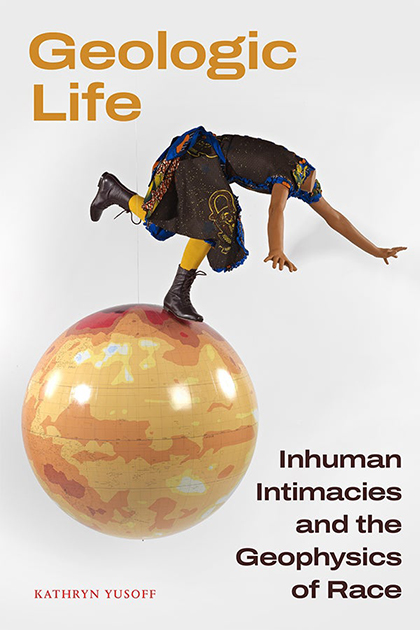Critical Inquiry Critical Inquiry
Kathryn Yusoff. Geologic Life: Inhuman Intimacies and the Geophysics of Race. Durham, N.C.: Duke University Press, 2024. 608 pp.
Review by Eyad Houssami
18 July 2025
The sentience of flora and fauna has become axiomatic in the discourse on the environment. But has a preoccupation with life as bios—in other words, polar bears, bees, trees, fungi—become suffocatingly hegemonic? Shall we pay heed to the animacy of stones and rocks too? That inquiry propels Kathryn Yusoff’s Geologic Life, an expansive history of geology that fuses philosophy, aesthetics, Black critical studies, and grim forensics.
Since the release of A Billion Black Anthropocenes or None (2018), Yusoff has attained certain prominence in the history of science. Trained as a geographer specializing in Antarctica, she has trailblazed a path that draws from the likes of Sylvia Wynter, Katherine McKittrick, and Saidiya Hartman. Black Anthropocenes demonstrates how geology is an inherently racialized discipline, imbricated in the traffic between the inhuman and human, a transference which whiteness mediates. In Geologic Life, Yusoff takes issue with the notion of bios and its derivatives, for they are “grounded in and through a colonial earth” (p. 490). Not unlike environmental philosopher Timothy Morton in their book Hell (2024), she underscores, for example, how the idea of a biopolitical subject relies on the undergrounding of racialized (black and brown) bodies.[1] It relies on whiteness that levitates, that masters cosmic and planetary forces. Yet all biological life is “just an effect of those inhuman forces” (p. 267). Yusoff thusly argues for a conception of life as mineralogical and of rocks as kin. To kindle intimacy with the inhuman is, then, to overturn colonial geophysics.
The book, structured in four parts, opens with “a geologic dirge” and antecedes the chapters with a glossary and an “analytic” section dedicated to semantic mathematics: for instance, “Inhuman ≥ void, matter” (p. 30). Yusoff’s deft—and distinctive—notational system peppers her arguments throughout and buttresses her commitment to forging new modes of thinking about matter (both organic and inorganic). In terms of periodization, Geologic Life turns to the massive Lisbon earthquake of 1755 as the event which precipitated post-theological conceptualizations of the planet. That is when “geology also became a secular story of the planet” in Europe (p. 127). Meanwhile, the field of paleontology arose and began locating black bodies as ancestral humans within subterranean strata, abetting the position of the settler colonist in a teleology of human progress.[2] This Wynter-inspired framing of scientific disciplines as doubly secularized and racialized also typifies Banu Subramanian’s contemporaneous Botany of Empire.[3] However, the latter often integrates into her historiography the polyphony of various spiritualities that commingled with colonial science, a dimension that Yusoff essentially relegates to a single footnote (p. 535).[4]
Geologic Life makes its most horrifying revelations as the author focuses on resource extraction in Alabama. Starting from the abyss of the carceral mine and then shifting to the skyscrapers of Birmingham, she centers on the “undergrounding” of black life: “To carry coal from the seam, up the shaft, and into the white surface to deliver the appearance of a magic city. This is the geophysics of whiteness” (pp. 346, 367). In post-emancipation Alabama, the prison system remained unregulated until 1883. Convicts—more than 95 percent of whom were African American—were leased to mining conglomerates such as United States Steel. These mines were death traps: around 10 percent of the men enrolled in carceral mine labor died. Yusoff’s tome addresses dozens of similarly gut-wrenching cases of racialized injustice. The goal is to denude geology and its infrastructures predicated upon “subjectless matter” (p. 2). Her chef d’oeuvre has elicited heated reactions, from geologists and others alike. More than two thousand comments have been posted to a Daily Mail article about it.[5] The Guardian describes the impact of the book as “a culture war.”[6]
The scope of Geologic Life is vertiginous: the mathematical formulas, (often painful) archival accounts of dehumanization, and analyses of contemporary art woven into the book contribute to this expansiveness. It is precisely this quality of “superabundance” that the cosmic scale of the geos purveys (p. 302). A path toward liberatory politics, life as geos appears to be unshackled by the axioms of bios and its racialized gravities. The way in which Yusoff destabilizes the presumptions of Life overturns ecocide’s platitudes, throwing into question the limits of our earthly attachments.
[1] Timothy Morton, Hell: In Search of a Christian Ecology (New York, 2024).
[2] On hydrogeology and settler colonialism, see Simone Popperl, “Geologies of Erasure: Sinkholes, Science, and Settler Colonialism at the Dead Sea,” International Journal of Middle East Studies 50 (Aug. 2018): 427–48.
[3] Banu Subramaniam, Botany of Empire: Plant Worlds and the Scientific Legacies of Colonialism (Seattle, 2024).
[4] For more on the sacred and mining, see Robyn d’Avignon, A Ritual Geology: Gold and Subterranean Knowledge in Savannah West Africa (Durham, N.C., 2022).
[5] Rory Fleming, “Geology Is Racist as It Is ‘Linked to White Supremacy’ Claims Queen Mary University of London Professor,” Daily Mail, 16 Nov 2024.
[6] Miriam Frankel, “Rocks and Racism? How Geologists Created and Perpetuated a Narrative of Prejudice,” Guardian, 16 Mar. 2025.

